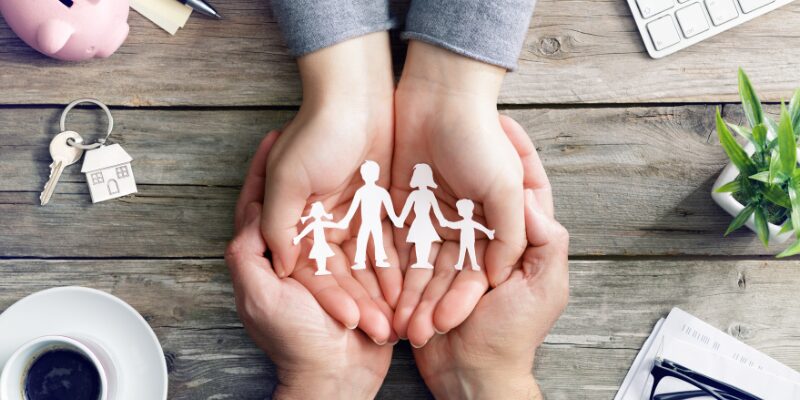
Navigating Complex Family Dynamics in Family Enmeshment
- January 5, 2024
- Community and Support
- 0 Comments
Families are unique in their bonds and support structures. While some family dynamics are seen as positive and supportive, others raise concerns. An enmeshment family is a situation where each member becomes emotionally reactive and unhealthyly interconnected.
Table of Contents
In this article, Mental Map Guide will break down the concept of enmeshment, give some examples of enmeshment, and provide signs to realize. You will learn how it develops and its potential impact on mental health, and provide practical strategies to overcome relationship challenges. Let’s delve into a comprehensive understanding of family connections and ways to foster healthier dynamics.
What is Enmeshment?
Enmeshment refers to different kinds of relationships and emotional connections. It can be a family system where everyone is emotionally close, and there is no separation between parent and child. In these families, personal space and independence must be clarified because everyone is involved in each other’s lives. In the long run, this can build a person’s character in a negative direction, for example, losing the ability to handle challenges and change.
Causes of enmeshment?

Are you in relationships that lack support or celebrating differences with each other? You will likely decide based on what others think they want rather than your needs. Then, you might be in an enmeshed relationship.
Of course, it’s impossible to be 100 percent accurate based on that alone, but you can learn more about the reasons for enmeshment here.
Enmeshment in relationships happens for various causes, mostly linked to how families work and individual experiences. Here are some common reasons for enmeshment:
- When parents are too protective, they let their kids rely on them in almost everything.
- Past traumas or feeling insecure, cultural expectations, or society.
- If parents had enmeshed relationships, their kids could follow the same pattern.
- Lack of healthy communication
- Don’t have clear emotional boundaries in a family
What is Family Enmeshment?

Family enmeshment is the same idea as “enmeshment” but happens specifically within a family. It can be good because it generates a strong sense of connection, but it can also be not-so-good because it might make it tricky for personal growth. Basically, it’s about not having individual boundaries, and everyone may be too involved in each other’s stuff.
This enmeshed relationship can create stress, upset, anxiety, frustration, fear, or other emotions when there are no healthy boundaries.
But because life is so busy and challenging, we often need to realize or pay attention to this problem.
If you slow down, you can see how much this happens around you. For example, enmeshment appears in the family of your friend, neighbor, or relative,… and it happens in each generation.
The thing is, enmeshment might be a pattern that passes down through generations. Growing up in a family where everyone has no privacy can affect how you handle relationships as an adult.
If you’re not independent and are used to relying on others for everything, it would be easy to end up in a controlling or emotionally abusive relationship. Why? Because it’s hard for you to decide on your own or find happiness without depending on someone else.
So, What happens when someone from an enmeshed relationship becomes a parent? They can accidentally continue this pattern with their kids. They show their love and things that they think are good for kids, protect them, and don’t get anything that hurts their kids.
And obviously, more of anything is needed. It’s like a shell, wrapping the children around their parents’ small world. This is how the cycle keeps going from one generation to the next.
Mental Health Effects
Being in enmeshed relationships can mess with your mental health. Here are some common things you might go through:
1. Lack of Individual Identity: It’s challenging to figure out who you really are when everything is mixed up with others, and it can make you feel you’re losing yourself.
2. Anxiety and Stress can occur—especially when you have to function alone.
3. Conflict in Relationships: you need help to balance your needs with the expectations and emotions of others.
4. Trouble in Romantic Relationships: You might copy what you learned from your family in an enmeshment way.
5. Low Self-Esteem: always being in others’ stuff and not achieving things on your own will make you feel not so great about yourself.
Overcoming Enmeshment Trauma

Enmeshment trauma can make it challenging to form healthy connections and keep your individuality intact. The good news is there are tons of methods out there that might help you overcome trauma from enmeshment.
Mental Map Guide also has three practical tips for solving this problem. It’s simple. It’s super easy to follow. All you have to do after reading is start doing and commit, stick with it, and check the result.
1. Boundary Setting:
Enmeshment, a type of emotional control through manipulation, makes it hard to establish boundaries, which are usually absent in enmeshed relationships. When in this relationship, family members feel compelled to rely on each other for their self-worth, leaving little room for independent functioning.
When learning to set boundaries:
- Start slowly.
- Despite the discomfort, say no or pursue things without seeking permission or validation.
- Take time to identify activities that bring personal happiness, irrespective of their impact on others.
2. Mindfulness:
Growing up in an enmeshed family can be challenging, and it can be tough to recognize enmeshed relationships as an adult. Mindfulness includes focusing on the present moment, both external surroundings and internal responses.
Practicing mindfulness helps:
- Bring attention to interactions with others.
- Identify feelings towards these interactions.
- Recognize patterns indicating an enmeshed relationship.
Example: Realizing that with a specific friend, you consistently prioritize their wants, suppressing your needs and interests—a potential sign of an enmeshed relationship.
3. Therapy:
Acknowledging the impact of an enmeshed upbringing is challenging. Setting boundaries, saying no, and finding personal identity can be difficult. Seeking guidance from a mental health professional can break the enmeshment cycle.
Therapy benefits:
- Individuals struggling with enmeshment trauma.
- Parents are concerned about perpetuating enmeshment patterns.
To find a mental health therapist:
- Ask for a referral from a medical professional.
- Use an online therapist-finding tool.
- Obtain a referral from your healthcare provider.
Final Thought
You, me, and all of us have a family. So, loving and protecting our family members is something we should do. But, when families are too enmeshed, having your own space, developing your own identities, and healthily handling conflicts can be challenging. If this happens, try to use the method we mentioned above. We can not guarantee which one is the best, but they only work when you do.
Are you looking for a healthier and more balanced family life? Check out Mental Map Guide Blog to get more informative and valuable mental health information.






